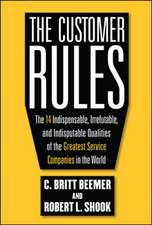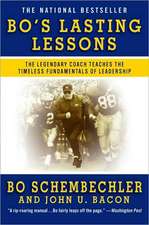Theories of Corporate Governance
Editat de Thomas Clarkeen Limba Engleză Hardback – 12 aug 2004
This comprehensive reader brings together the most influential writing in the field, with editorial commentary, to provide a uniquely interdisciplinary resource for students and lecturers that underpins contemporary analysis of corporate governance. Topics covered include:
- the separation of ownership and control
- how economic activity is organised through firms
- the managerial revolution in business
- agency, stewardship and stakeholder theory
- globalization and convergence
- the critique of shareholder value
- post-Enron analysis.
| Toate formatele și edițiile | Preț | Express |
|---|---|---|
| Paperback (1) | 475.18 lei 43-57 zile | |
| Taylor & Francis – 12 aug 2004 | 475.18 lei 43-57 zile | |
| Hardback (1) | 1345.16 lei 43-57 zile | |
| Taylor & Francis – 12 aug 2004 | 1345.16 lei 43-57 zile |
Preț: 1345.16 lei
Preț vechi: 1640.44 lei
-18% Nou
Puncte Express: 2018
Preț estimativ în valută:
257.48€ • 279.77$ • 216.42£
257.48€ • 279.77$ • 216.42£
Carte tipărită la comandă
Livrare economică 21 aprilie-05 mai
Preluare comenzi: 021 569.72.76
Specificații
ISBN-13: 9780415323086
ISBN-10: 0415323088
Pagini: 384
Ilustrații: 29 line drawings
Dimensiuni: 189 x 246 x 23 mm
Greutate: 0.98 kg
Ediția:New.
Editura: Taylor & Francis
Colecția Routledge
Locul publicării:Oxford, United Kingdom
ISBN-10: 0415323088
Pagini: 384
Ilustrații: 29 line drawings
Dimensiuni: 189 x 246 x 23 mm
Greutate: 0.98 kg
Ediția:New.
Editura: Taylor & Francis
Colecția Routledge
Locul publicării:Oxford, United Kingdom
Public țintă
Postgraduate, Professional, and UndergraduateNotă biografică
Thomas Clarke is Director of the Centre for Corporate Governance and Professor of Management at the University of Technology, Sydney. He has a doctorate from the University of Warwick Business School. Formerly DBM Professor of Corporate Governance at Leeds Business School and Visiting Professor at CEIBS, Shanghai, he was a member of the RSA Tomorrow's Company Inquiry that influenced the review of UK Company Law. At the OECD in Paris he helped develop the international corporate governance code adopted by governments throughout the world.
Recenzii
'[A] magisterial work. At whatever level corporate governance is being studied and reviewed, there can be no doubt about the value of Professor Clarke's book in bringing together and clarifying the theories which have contributed to, and have relevance for, the development of corporate governance.' - Sir Adrian Cadbury
'This unique collection brings together this widely dispersed material for the first time, providing students and researchers in corporate governance with an unrivalled resource.' - International Institute of Administrative Sciences
'Every student of corporate governance will want to read Thomas Clarke’s book to aid them in making sense of what is otherwise becoming an endless corporate governance maze.' - Professor Douglas M. Branson, University of Pittsburgh, USA
'This unique collection brings together this widely dispersed material for the first time, providing students and researchers in corporate governance with an unrivalled resource.' - International Institute of Administrative Sciences
'Every student of corporate governance will want to read Thomas Clarke’s book to aid them in making sense of what is otherwise becoming an endless corporate governance maze.' - Professor Douglas M. Branson, University of Pittsburgh, USA
Cuprins
1. Theories of Governance: Reconceptualising corporate governance theory after the Enron experience Thomas Clarke Part 1: Economic Foundations 2. The Managerial Revolution in American Business Alfred D. Chandler (1977) 3. The Impact of the Corporation on Classical Economic Theory Berle,A. (1965) Part 2: Agency Theory 4. Theory of the Firm, Managerial Behaviour, Agency Costs and Ownership Structure Jensen, M.C. and Meckling, W.H. (1976) 5. Separation of Ownership and Control Fama,E. and Jensen,M. (1985) 6. Agency Theory: An assessment and review Eisenhardt, K.M. (1989) Part 3: Managerial Hegemony 7. Directors: Myth and reality Mace, M. (1971) 8. Pawns Or Potentates: The Reality of America's Corporate Boards Lorsch, J. and MacIver, E. (1989) Part 4: Stewardship Theory 9. Towards A Stewardship Theory of Management Davis, J.H., Schoorman, F.D., and Donaldson, L. , (1997) Part 5: External Pressures 10. The Resource Dependence Role of Corporate Directors: Strategic adaptation of board composition in response to environmental change A.J.Hillman, A.A. Cannella, and R.L. Paetzold (2000) 11. Institutional and Strategic Choice Perspectives on Board Involvement in the Strategic Decision Process W.Q.Judge and C.P. Zeithaml (1992) 12. A General Theory of Network Governance: Exchange conditions and social mechanisms C.Jones, W.S. Hesterly and S.P. Porgatti, (1997) Part 6: Stakeholder Theory 13. Ownership and Control: Rethinking corporate governance for the 21st century Margaret Blair (1995) 14. The Stakeholder Corporation: A business philosophy for the information age Thomas Clarke (1998) Part 7:Theories of Convergence 15. Corporate Leadership in a Globalising Equity Market Michael Useem (1998) 16. Corporate Governance and Globalisation: Is there convergence across countries? Mauro F. Guillen (2000) 17. Capital Unbound?: The transformation of European corporate governance Rhodes, M. and Apeldoorn, B.v. (1998) 18. The Very Uncertain Prospects of Global Convergence In Corporate Governance Douglas M. Branson (2001) Part 8: Critique of Shareholder Value 19. Maximising Shareholder Value: A new ideology for corporate governance Lazonick, W. and O'Sullivan, M. (2000) 20. Corporate Governance, Property and Democracy: A conceptual critique of shareholder ideology Ewal Engelen Part 9: Post-Enron Theories 21. What Enron Means for the Management and Control of the Modern Business Corporation: Some initial reflections Jeffrey N. Gordon (2002) 22. What Caused Enron?: A capsule social and economic history of the 1990s John Coffee (2003)
Descriere
This book provides a valuable grounding in the classical theories underpinning contemporary analysis of corporate governance.




















